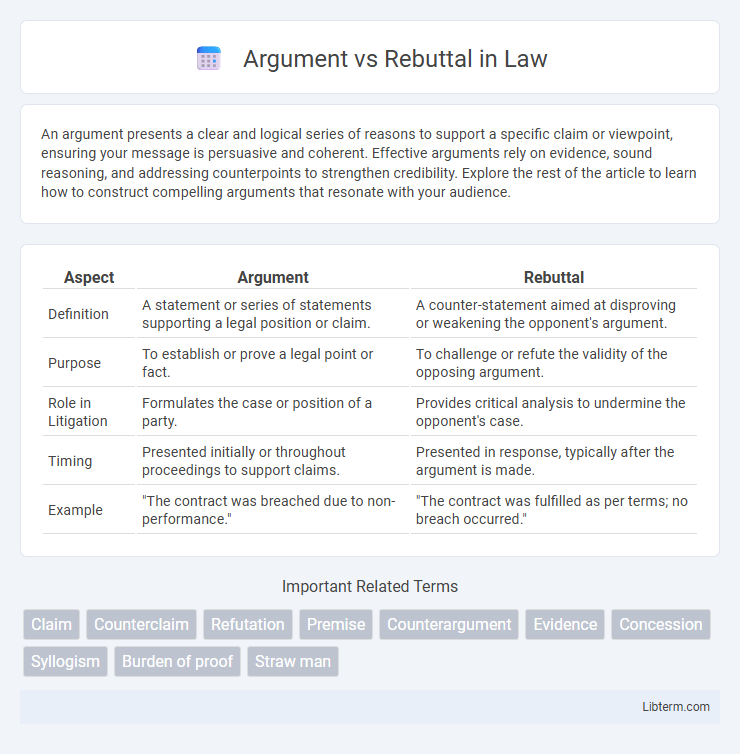An argument presents a clear and logical series of reasons to support a specific claim or viewpoint, ensuring your message is persuasive and coherent. Effective arguments rely on evidence, sound reasoning, and addressing counterpoints to strengthen credibility. Explore the rest of the article to learn how to construct compelling arguments that resonate with your audience.
Table of Comparison
| Aspect | Argument | Rebuttal |
|---|---|---|
| Definition | A statement or series of statements supporting a legal position or claim. | A counter-statement aimed at disproving or weakening the opponent's argument. |
| Purpose | To establish or prove a legal point or fact. | To challenge or refute the validity of the opposing argument. |
| Role in Litigation | Formulates the case or position of a party. | Provides critical analysis to undermine the opponent's case. |
| Timing | Presented initially or throughout proceedings to support claims. | Presented in response, typically after the argument is made. |
| Example | "The contract was breached due to non-performance." | "The contract was fulfilled as per terms; no breach occurred." |
Understanding Arguments: Definition and Purpose
An argument is a coherent set of statements aimed at supporting a specific claim or conclusion by providing evidence and reasoning. The primary purpose of an argument is to persuade others of the validity of a particular viewpoint through logical presentation and analysis of facts. Understanding the structure and function of arguments is essential for effective critical thinking and constructive debate.
What Constitutes a Rebuttal?
A rebuttal specifically addresses and challenges the claims made in an argument by providing evidence or reasoning that contradicts or weakens the original point. It seeks to refute or invalidate the opponent's stance rather than merely presenting an alternative perspective. Effective rebuttals use logical analysis, factual data, and critical thinking to dismantle the foundation of the opposing argument.
Key Differences Between Argument and Rebuttal
An argument presents a claim supported by evidence and reasoning to persuade an audience, while a rebuttal directly challenges or counters an argument by identifying flaws or presenting opposing evidence. The key difference lies in their roles: arguments build a position, and rebuttals defend or refute it. Effective communication relies on understanding that arguments establish points, whereas rebuttals critically evaluate and respond to those points.
Structure of a Strong Argument
A strong argument consists of a clear claim supported by relevant evidence and logical reasoning, ensuring that each point directly reinforces the main thesis. Incorporating credible sources and data enhances the argument's persuasiveness and authority. Anticipating counterarguments and preparing concise rebuttals further strengthens the overall structure by addressing potential objections effectively.
Effective Rebuttal Strategies
Effective rebuttal strategies involve carefully listening to the opposing argument to identify logical fallacies, inconsistencies, or unsupported claims. Using evidence-based reasoning and clear, concise language strengthens the response and undermines the opponent's position without attacking the individual. Prioritizing respectful tone and highlighting common ground enhances persuasion and credibility during debates or discussions.
Common Mistakes in Arguments and Rebuttals
Common mistakes in arguments include relying on weak evidence, misinterpreting facts, and committing logical fallacies such as ad hominem or straw man attacks. In rebuttals, errors often involve misunderstanding the opponent's position, presenting irrelevant counterpoints, or failing to address the core claim directly. Effective argumentation requires clear, relevant evidence and precise counter-claims that specifically target the original assertions.
Role of Evidence in Arguments and Rebuttals
In arguments, evidence serves as the foundation that supports claims by providing verifiable facts, data, or examples, enhancing the argument's credibility and persuasiveness. Rebuttals utilize evidence to directly challenge the opposing argument's validity, exposing flaws, inconsistencies, or inaccuracies with counter-evidence. The strategic use of relevant and reliable evidence in both arguments and rebuttals strengthens the overall discourse and facilitates critical evaluation of differing viewpoints.
Argument vs Rebuttal in Debates
In debates, an argument presents a claim supported by evidence and reasoning to persuade the audience or judges. A rebuttal directly challenges the opponent's argument by identifying flaws, contradictions, or presenting counter-evidence to weaken their position. Effective rebuttals are critical for defending one's stance and undermining the opposing team's credibility in competitive debate formats.
Techniques to Strengthen Your Rebuttal
Effective techniques to strengthen your rebuttal include anticipating opposing arguments and preparing evidence-based responses to counter them. Employ logical reasoning and credible sources to undermine the validity of the original claim while maintaining a respectful tone. Utilizing clear, concise language and addressing specific points enhances the persuasive impact of your rebuttal.
Importance of Arguments and Rebuttals in Critical Thinking
Arguments provide the foundation for presenting reasoned claims supported by evidence, enabling clear communication of ideas and fostering logical analysis. Rebuttals play a crucial role in critical thinking by challenging assumptions and identifying flaws in reasoning, which helps refine understanding and strengthen positions. The dynamic interplay between arguments and rebuttals promotes deeper evaluation and enhances decision-making skills.
Argument Infographic

 libterm.com
libterm.com